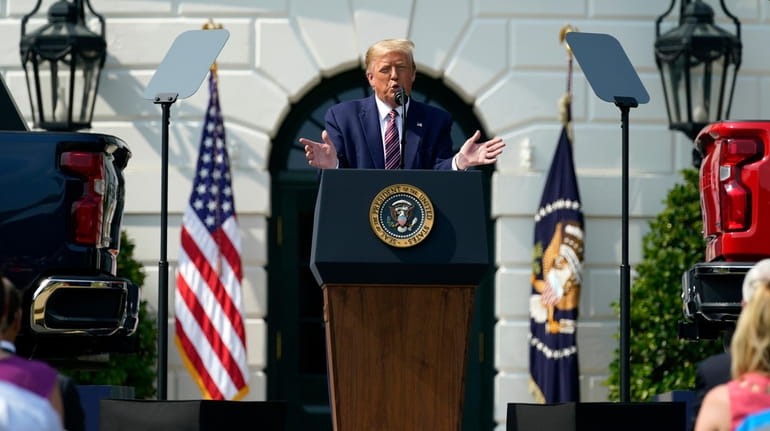Donald Trump's water problem

President Donald Trump speaks during an event on regulatory reform on the South Lawn of the White House on July 16, 2020. Credit: AP/Evan Vucci
There must be something seriously wrong with the plumbing in the White House or at Mar-a-Lago. For the past few months, Donald Trump has complained about having to flush “toilets 10 times, 15 times, as opposed to once” and showers, faucets, and dishwashers that didn’t work, to the amusement of his audiences and the evening talk shows. Last week, on the White House lawn, he again lambasted showers and dishwashers:
“So shower heads, you take a shower, the water doesn’t come out. You wanna wash your hands, the water doesn’t come out. So what do you do? You just stand there longer, or you take a shower longer because my hair … I don’t know about you but my hair has to be perfect, perfect.”
Watching the videos of these comments, you can see him reveling in the laughter produced by his toilet jokes and comments about his hair.
But these comments aren’t funny. Their purpose is to tarnish the regulations that save consumers money, water, and energy — part of a broader anti-regulatory drive throughout the government. For example, the organization FreedomWorks has pushed efforts to roll back regulations that reduce the use of climate-threatening fossil fuels, including a “Make Dishwashers Great Again” campaign, an effort even opposed by the appliance industry.
The concept of improving efficiency is simple: Can we find better ways to get what we want with fewer social, economic, and environmental costs? The answer is yes. We can grow more food with less water and fewer chemicals. We can build safer cars that go farther on a gallon of gasoline or use no fossil fuels. We can clean our clothes, dishes, and bodies using less water and energy. But these changes require investments in new infrastructure and the mobilization of other tools to improve technologies, expand consumer choices, and change behavior.
Regulation is one such tool. Governments regulate airplane, automobile, and worker safety. They control advertising of dangerous products like cigarettes and limit poisonous air and water pollutants. And they use regulations when industries won’t do these things voluntarily.
Nearly 30 years ago, the bipartisan 1992 Energy Policy Act was signed by President George H.W. Bush. It included the first standards for water and energy efficiency, including toilets, showerheads, dishwashers, and washing machines. For example, old toilets in the United States used six gallons of water per flush. The federal standard is now 1.6 gallons per flush; some states have even stricter standards.
Trump’s complaints that these fixtures don’t work well are nonsense. Consumers can choose from hundreds of modern, efficient, low-cost models, reengineered over the past decades. My high-efficiency appliances work far better than older versions, and they save me water, energy, and money. If Trump’s bathrooms have bad toilets or drippy showerheads, they should be replaced with modern ones that work.
Efficiency standards make a difference. Water consumption in American homes has dropped 20% since 1990, saving trillions of gallons of water and tens of billions of dollars in water and energy bills, while also cutting greenhouse gas emissions. The good news is the Environmental Protection Agency recently completed a review of the federal WaterSense program and decided not to weaken the standards. The bad news is there’s room for improvements and the EPA isn’t pursuing them.
It’s easy to mock drippy showers or clogged toilets, but what’s being mocked are efforts to modernize our industries and technologies simply because of the mistaken idea that we should go back in time to the old, inefficient, wasteful days. That’s an idea that should be flushed down the drain.
Peter Gleick, a co-founder of the Pacific Institute, is a member of the U.S. National Academy of Sciences and a MacArthur Fellow.
Correction: An earlier version of this piece incorrectly stated the relationship between FreedomWorks and the Koch organization. FreedomWorks is not a Koch organization; FreedomWorks is a member of the State Policy Network, a nonprofit umbrella organization for a group of conservative and libertarian think tanks partly supported by Koch institutions.
